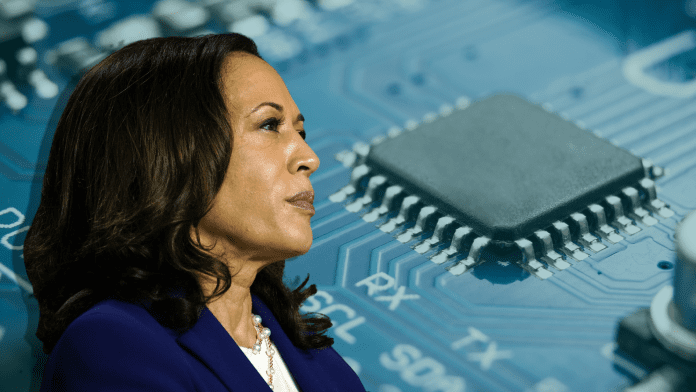Vice President Kamala Harris is in the middle of a diplomatic visit to Japan, where she is scheduled to meet with several semiconductor-related businesses as part of the Biden administration’s push to boost US semiconductor chip manufacturing.
Harris is expected to highlight the recently passed CHIPS and Science ACT, which provides $52.7 billion in subsidies and incentives for companies who invest in semiconductor manufacturing in the United States. She is also expected to touch on the benefits of companies moving manufacturing hubs away from their dependence on single, low-cost countries like China in an effort to prevent supply chain disruptions.
The Biden Administration has been focused on efforts to build high-tech semiconductors in the US, which they say will preserve American jobs and provide competition for China. The newly passed CHIPS and Science ACT was created to help alleviate persistent shortages which have slowed the production and sale of numerous products, including vehicles. Shortages of semiconductor chips have also added to rising inflation in the US, which reached 8% last month.
Executives from 13 companies are expected to meet with the vice president, including Sanken Electric, Tokyo Electron, Hitachi High-Teck, Fujitsu, and Nikon, according to an administration official who declined to be named.
Vice President Harris also assured the Prime Minister of South Korea this week that Washington will do its best to allay Seoul’s worries regarding recently adopted electric vehicle (EV) subsidies that would hurt foreign automakers.
Many of President Biden’s initiatives are included in the $430 billion Inflation Reduction Act measure that was passed in August, including expenditures to halt climate change and establish Washington as a global leader in the EV industry.
According to a senior Biden administration official, numerous discussions about how to resolve South Korea’s concerns have already taken place within the US government.
“She listened very carefully and made clear our commitment to work within the US government – the US Trade Representative, the Treasury Department – as we look … to help address that issue,” the official said.
In an effort to boost manufacturing jobs in the United States and forge a united front against China, which Biden sees as the nation’s main ideological and economic rival, Biden has sought to expand business ties with South Korea.
Did you enjoy this article? Please share your thoughts, comments, or questions regarding this topic by connecting with us at newsroom@cbtnews.com.
Be sure to follow us on Facebook, LinkedIn, and TikTok to stay up to date.
While you’re here, don’t forget to subscribe to our email newsletter for all the latest auto industry news from CBT News.



